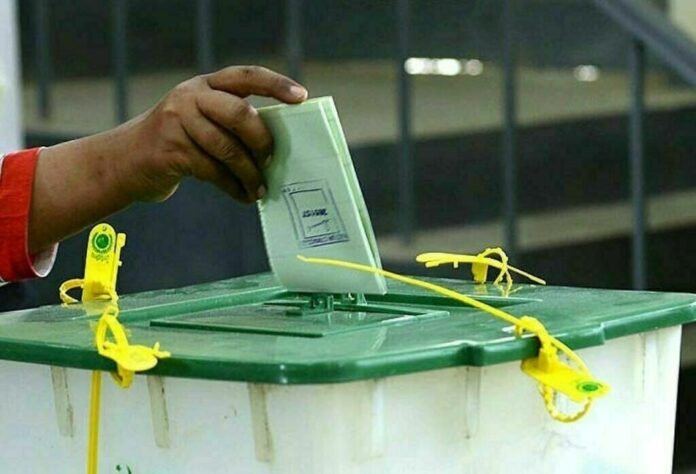The political instability in Pakistan is generally attributed to the frequent military interventions, though apparently true but history is witness that military only intervenes once incompetent corrupt politicians fail miserably. The people always welcome the change, but after few years they are booted out, the cycle continues. The PPP government elected in 2008 completed its 5 years, it was replaced by PML(N) after the elections in 2013. The Election Commission and the incumbent government failed to address the massive rigging allegations of PTI (Pakistan Tehreek Insaf). The resultant protests created political instability, unless the issue is addressed though electoral reforms the democracy cannot flourish. The debate for electoral reforms has brought many aspects in to lime light. While the experts will come out with workable comprehensive reform package it is pertinent to highlight certain weaknesses in the existing electoral system with some broad suggestions.
It is true that during all political crisis the parliament fails to deliver, governments with even 2/3 majority in the parliament fail miserably resulting in welcome military takeover. Present electoral system has repeatedly proved its ineffectiveness, because it does not genuinely represent the will of majority of people, hence it needs to be reformed to get genuine lawmakers representing will of people.
One needs to ponder as to what is wrong with the political system in Pakistan? Two aspects needs immediate attention, firstly the quality of politicians or the elected representatives, secondly the prevalent democratic political system. Both are complimentary hence should be viewed together rather than in isolation.
The spirit of democracy is in representation of the will of people through their elected representatives in parliaments. If the parliament does not include representatives from all the segments of society rather represent minority, it will not be democracy but an illusion.
It is interesting that in the massively rigged elections held in May 2013, 84 million voters were eligible to vote out of which 45 Million (55 %) cast their votes. The PML (N) got around 14.3 Million votes or 33% of the votes [in real terms 18% of total registered votes, 82% opposed], 30.5 Million (67%) people voted against PML (N), but as per the existing system it formed the government being a party with parliamentary majority. How can it claim to posses the mandate of majority? This problem is further compounded with allegations of massive rigging.
In order to address this issue, there is not one uniform electoral system in the world. There are different electoral and political democratic systems like Presidential System, British Parliamentary system and mix of both. Similarly the systems of voting adopted by different countries are also suitable to the level of education and local environments. Effort is being made here to identify the problems in present electoral system in Pakistan with a view to suggest possible remedies for improvement.
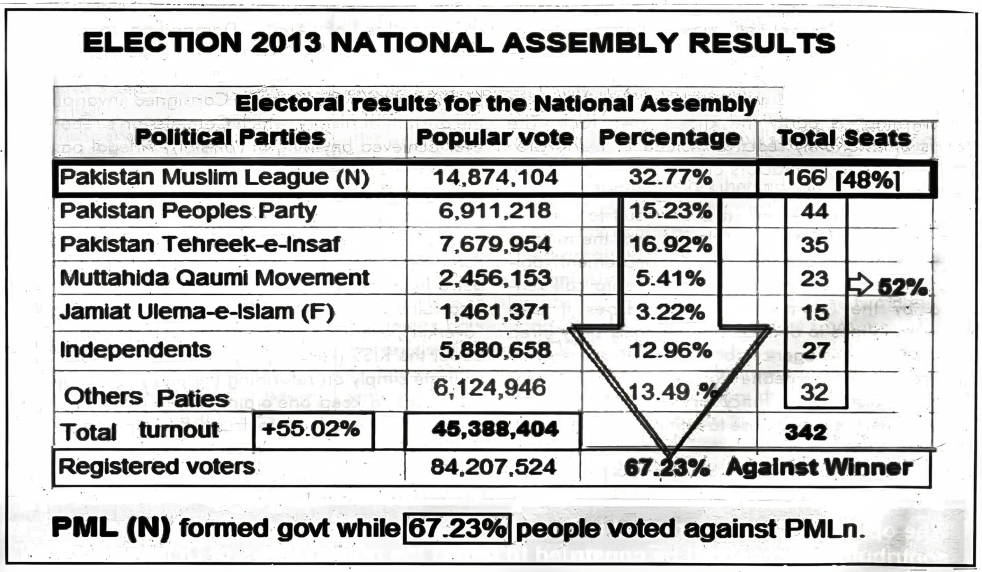
Politicians
Politics is the business of rich especially in Pakistan. After winning the election their first priority is to recover election expanses and expenses for next election. There are around 1200 elected members at federal and provincial houses in Pakistan, who are perceived to be corrupt. The figure of 1200 corrupt out of total population of 180000000 is very small, rather insignificant fraction which can be ignored if they are ordinary clerks, peons, laborers, workers etc, but these 1200 people are the elite who select the rulers, they are law makers, they form policies and run the government to rule 180000000 people. These 1200 people have the pivotal position of ‘brain’ in a body. If the heart, lungs, kidneys and all the other organs are functioning properly but there is a problem in the ‘brain’ can that man be called healthy? A person with brain malfunction is useless; he may be lying in bed in paralysis at the mercy of life support equipment and medics – sometimes even called ‘brain dead’ though all other organs are working properly. Here a German saying appears very appropriate: ‘fish starts to rot from brain’.
If we want to reform the society and progress as a respectable nation, we need good leaders, good politicians who should steer the country out of trouble not only filling their accounts with looted money. Higher the status of a person in government hierarchy higher is the standard of honesty, morality and character expected. Why the American and Westerners criticize their leaders for minor lapses? They force them to resign on matters considered petty in Pakistan standards [Richard Nixon, Bill Clinton]. Remember the famous saying; ‘Army of lions led by a jackal is doomed, but the army of jackals led by a lion will deliver victory’.
Pakistan is passing through a crisis of its existence, how can we expect a gang of corrupt, dishonest and incompetent politicians to take us out of this quagmire? We have to support and elect the honest, competent people with high integrity to lead, till then keep on exerting pressure on present political leadership and institutions to perform well, remain accountable to judiciary and people.
Even the Constitution of Pakistan takes in to cognizance the moral aspects of elected representatives in Article 62 (d to h), also applicable to President:
(d) He is of good character and is not commonly known as one who violates
Islamic Injunctions;
(e) He has adequate knowledge of Islamic teachings and practices obligatory
duties prescribed by Islam as well as abstains from major sins ;
(f) He is sagacious, righteous and non-profligate and honest and ‘Ameen’;
(g) He has not been convicted for a crime involving moral turpitude or for
giving false evidence;
(h) He has not, after the establishment of Pakistan, worked against the integrity
of the country or opposed the Ideology of Pakistan.
Elections 2008
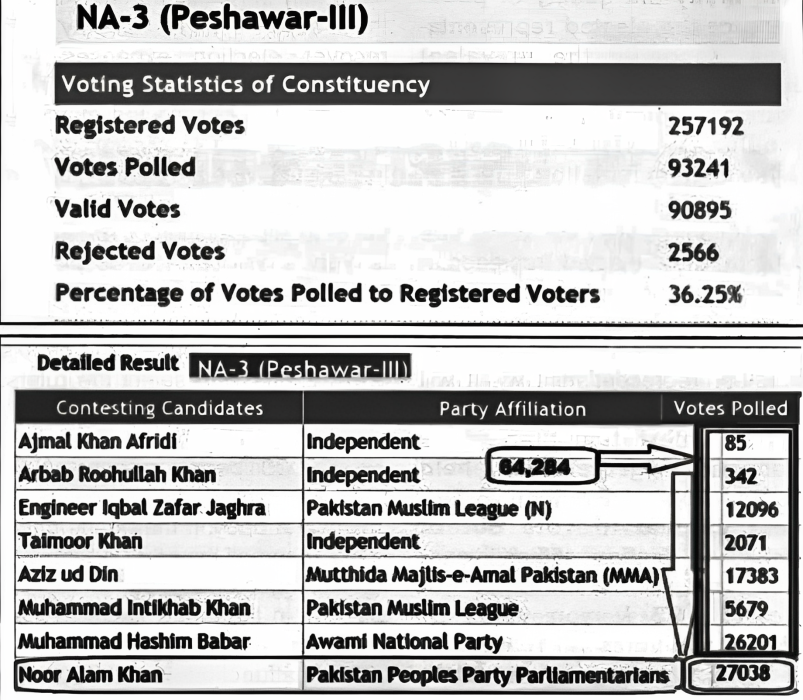
Deliberately no legislation has been done by parliament to implement these clauses of constitution as it would hurt them the most. It is argued that article 62 (d to h) is not implemental. It is argued that article 62 (d to h) is not implementable, but they dare not remove it due to fear of public reaction. So what is democracy if the wishes of people of Pakistan are not implemented?
Giving them free hand to plunder would be disastrous. 1200 people out of 180000000 are insignificant but even one man who heads the government is important, if he is honest and sincere the effects will travel down. However we should keep their past in view, the nature can not change, to quote: “A leopard cannot change his spots “; “Abyssinian cannot change his skin colour”; brackish wells do not become sweet even if you fill it with sugar, the children of snake can never become friend even if you feed them with milk.
If the ‘innocent’ politicians do not want to be criticized, they may choose some other ‘profession’ but now why are even businessmen also joining politics? Because it is lucrative and is used to protect and expand their business empires. They do not even declare their REAL assets? A weak Election Commission has not been able to sort out the fake degrees mess so far. Let it be known to every one that any one joining the politics must be ready for the scrutiny; they are not ordinary 1200 people to be ignored for their follies. If not checked they will be [they are] ruining the life of 180 million people!!!
Political System
The present British modelled parliamentary system suits the political elite, they hold reign of power through this system. After elections 2008, under the pretext of ‘Reconciliation’ & ‘Charter of Democracy’ Zardari [PPP] and Nawaz Sharif [PML n] both corrupts joined [under] hand to take their turn of loot and plunder. Mr. Asif Zardari took it to new heights, MQM, JUI (F) left after taking their share, while PML (Q) has just joined the loot. The people, civil society, few honest politicians, Judiciary and Media could only make hue and cry against oppression. Mr. Nawaz Sharif after elections 2013 returns the gesture by keeping quiet on all allegations of corruption of the Zardari government.
Too much power is concentrated with the parliamentarians, who have persistently proved to be unworthy of it: “Power corrupts and absolute power corrupts absolutely”, power to plunder is the norm. The chief executives [CE], Prime minister [PM] and chief ministers [CMs] of provinces are totally dependent on members of parliament for their election and to remain in power. Even an angel PM cannot remain fair under such circumstances of blackmail. They pressurise CE to get undue favours in return for their support to keep PM and CMs in power. Unless the political system is reformed the musical chair of power between politicians and military would continue with no regard to the welfare of general public.
If the monopoly of parliamentarians is restricted by taking away their power to elect the Prime Minister, President, Senators, women and minority seats, which could also be elected through direct vote of people, corruption would decrease. The parliamentarians should be law makers so that the genuine people can come forward. To keep President, PM and CM under check, the parliament with 75% votes should be able to impeach them. US, French and German constitutions should be looked at, they are not non-democratic. Like in the US, the executive should be separated from legislative. Development of road, infrastructure is not the job of legislators; it’s the function of local government which should be further improved.
This political system is not divinely ordained; it could always be suitably modified to suit local environments. At times people with minority vote get elected, while majority gets no representation, if 100000 votes are divided among various candidates, candidate A getting 15000, B 25000, C 15000, D 20000, E 10000, F 15000 candidate B with 25000 votes is winner with 25% votes while he was rejected by majority 75%, who remains unrepresented, this not fair democracy.
Out of many cases, here NA-3 results in 2008 elections are shown to explain the point: Mr. Noor Alam Khan with 30% of polled votes is the winner while 70% people cast votes against him to other candidates, actually he got only 10% of total registered votes, if 45% bogus votes are excluded the figure falls down significantly (5.5%). The extract of results is self explanatory:
Hence the majority [64284] is not represented in parliament, how could it be called democracy? No one has ever even seriously debated this aspect, resolving it is far fetched objective. Those not represented in parliament have to wait for next elections after 5 years or resort to protests and violence. Effort should be made to provide representation to maximum political groups [100% is ideal but it may not be possible], so that even small parties [getting overall 5% of polled votes] could get representation in parliament. The representatives would be able to put across their point of view in democratic way not feeling dejected, resorting to other means including violence.
Issue of proper election could be resolved through 2nd round of voting among top two or Proportional Representation [PR] system. Let’s look at the prevalent voting systems.
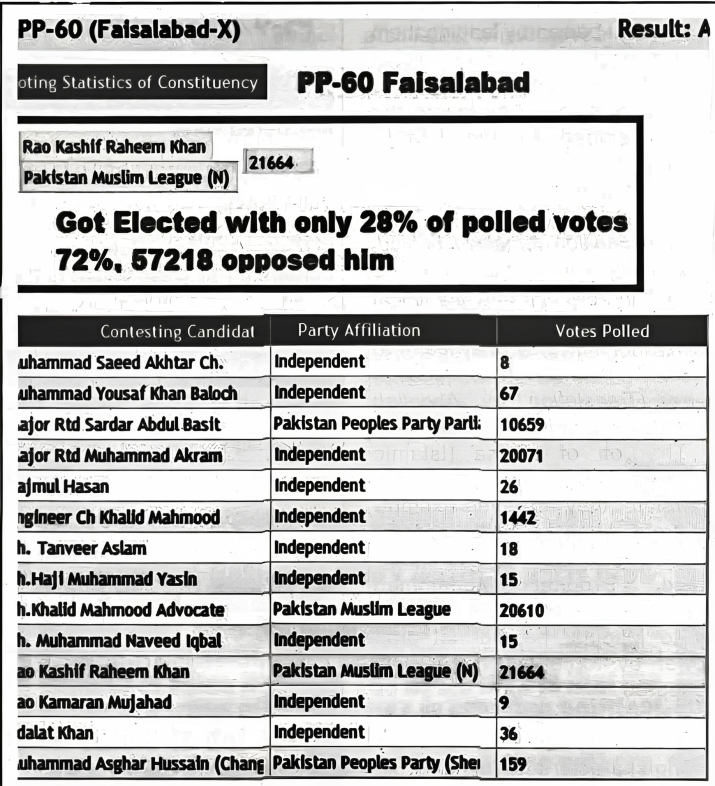
Use of Religion in Power Politics
Pakistan is an Islamic state; the constitution acknowledges the sovereignty of Allah and laws to be within bounds of Quran and Sunnah. The political parties cannot go against the constitution, hence the need of using Islam (religion) for political gains is questioned, as if those political parties not using the label of Islam are anti-Islam. This perception is not correct. There are political parties which use religious symbols like “Book” in elections as sign for “Quran” to attract the voters. This is exploitation of religion.
It must be understood that indulgence in the dirty game of power politics is not the role assigned to religious scholars by Allah in noble Quran. They should keep the role of great scholars and Imams like Abu Hanifa, Malic, Humble or Shafie [may Allah bless them] who peacefully resisted against tyranny of rulers but did not seek power. They knew well their actual responsibilities, to keep and preach the true message of Islam to all.
If someone is pious and religious but does not know driving, no one will take a chance to travel in the bus driven by such a person, as he will risk the life. The piety and religious knowledge is not sufficient for safe driving. Politics and running government is the job of people expert in this field. One is required to deal with many internal and external forces, to take all people along. Under Charter of Medina Muslims and non Muslims were given equal rights.
Some people are risking lives of innocent people by leading them to armed struggle, using religion for motivation. They think this is service to Islam. They ignore the task assigned to the Islamic Scholars by Quran:
“Nor should the Believers all go forth together: if a contingent from every expedition remained behind, they could devote themselves to studies in religion, and admonish the people when they return to them,- that thus they (may learn) to guard themselves (against evil). (Translation by Abdullah Yousuf Ali, Quran; 9:122)
The job of Ulema (Islamic Scholars) is teaching and preaching Islam, they are even exempted from Jihad, a great exemption if one can realise and understand. Prophet Muhammad (pbuh) preached Islam, migrated to Medina, he did not grab power by force but the people accepted him as their spiritual and political leader due to his strong character and qualities.
Our society needs preaching (Dawah) to know and practice true teachings of Islam. If scholars leave this primary task, who will reform society? No amount of jugglery of words and explanation can change the clear meanings of Quran 9:122.
A good Muslim society will produce good leaders, rulers and good people in all segments of society and Islam and Shari’a will get implemented without any resistance or Fisad. Hence it may be considered to ban use of religion for political purpose.
Election Systems
There are basically two systems in parliamentary elections; Majority Election System and the Proportional Representation System [PR]. Both systems do have advantages and shortcomings and there is no generally accepted preference. Two important points to be considered are equal and just influence of every vote on the electoral result and stability of the political system.
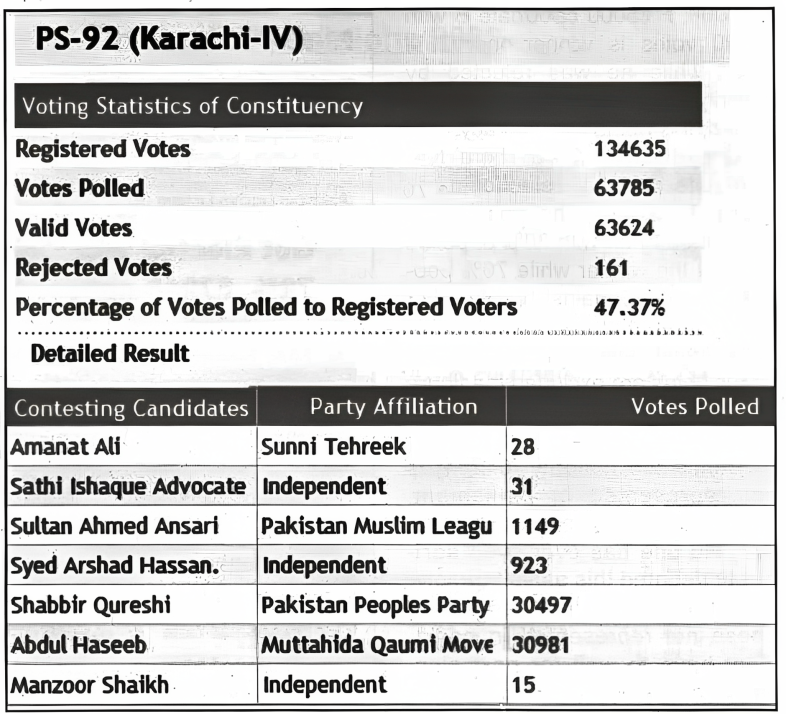
Plurality/ Majority systems
These are the winner-take-all systems that are usually used in the United States. They include the common plurality systems like the single-member district plurality vote and at large voting, and less common majority systems like the two-round runoff and the instant run-off.
Proportional representation systems
These voting systems are used by most other advanced Western democracies and are designed to ensure that parties are represented proportionally in the legislature. They include party list systems, mixed-member proportional, and the single transferable vote.
‘Semi-proportional systems’ are relatively rare worldwide; these systems have garnered some interest in the United State. They tend to produce more proportional results than plurality/majority systems, but less proportional results than fully proportional systems. They include cumulative voting and limited voting.
Majority Election System
With the majority election system, only one Member of Parliament is to be elected per constituency [area and group of voters living therein that is taken as a unit in the election process]. The basic idea is that the most qualified personality shall be selected to represent the constituency.
Analysis
With the majority election system, small parties have no chance to win a mandate unless there are some constituencies with a population having political views differing much from those in the rest of the country. With the size constituencies in big nations do have (some 100,000 voters) this is rather unlikely. Therefore the majority election system will inevitably lead to parties uniting or building blocks (tight alliances) until only two major players remain on the political scene. So voters are forced to select between the candidates of two big parties basically. While this tends to create a stable parliamentary majority for the government it is not likely to represent a pluralistic modern society adequately.
Supporters of a minority party might feel not being represented by the member of parliament rooted in their region because he or she represents the other party and other political concepts.
In a big nation, one member of parliament is going to represent some 100,000 inhabitants or even more, as in Pakistan. Evidently these people do not live in towns of exactly this size. To assign fairly equal numbers of inhabitants to every constituency, several villages and small towns must be grouped to form a constituency while large cities must be divided into several constituencies. There is no “natural”, evident rule of assignment.
In the past years it has repeatedly been reported that minor changes in the definition of constituencies were deliberately planned by governments of several countries (U.K., France, Pakistan and others) to ensure that their party could win a few mandates in a situation where government and opposition party have almost the same strength. The trick herein is the following: if there is a constituency with a solid majority for the government party, subtract a few towns voting overwhelmingly for the government and add them to a neighbouring constituency where the government party just needs a few percents more of the votes to win the election and exchange these towns for a few towns known to be voting for the opposition – so the government’s party will win both seats. In principle, this kind of manipulation is just as much electoral fraud as counting some votes twice or having some votes uncounted. The problem is: the existing old borders of a constituency might have been created by the same kind of manipulation by a former government and it is almost impossible to find a really neutral solution.
While the majority election system seems to be straightforward and simple at first glance, it leads to rather complex decisions that are not transparent to voters. This is definitely not a basis to create trust in democracy.
Proportional Representation System [PR]
With the Proportional Representation System several members of parliament are to be elected per constituency. Basically every political party presents a list of candidates and voters can select a list that is they vote for a political party. Parties are assigned parliamentary seats proportionally to the number of votes they get. The basic idea is that the political parties play a key role in creating political solutions (even in a majority election system). A reasonable number of competing parties will create more and better ideas while just two big parties (resulting from the majority election system) tend to be at a deadlock with inflexible positions.
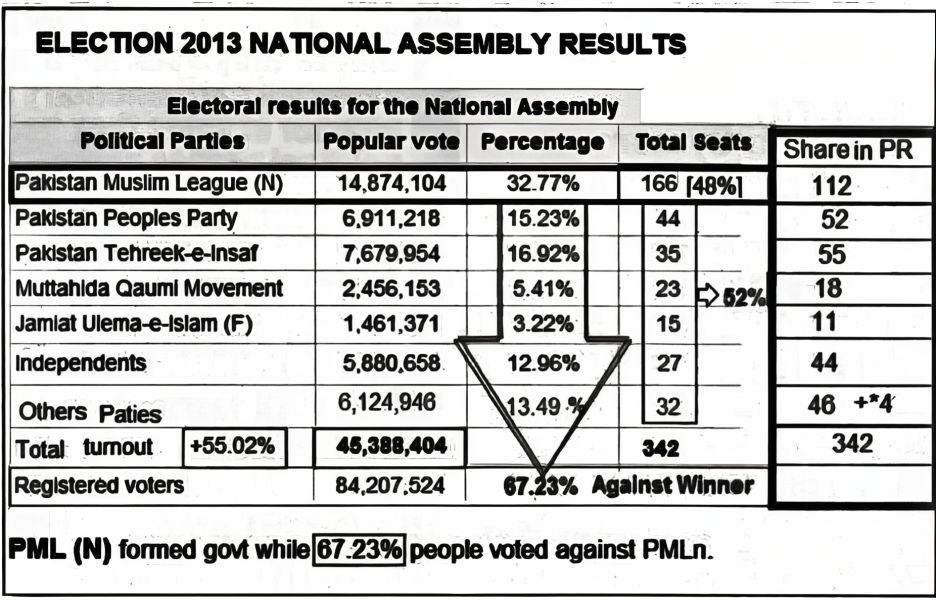
Analysis
With several parties there is more choice and voters are more likely to find a party that does represent their major political convictions than would be possible in a two-party system. Supporters of a small party are likely to be represented by at least one member of parliament rooted in their region and sharing their political views and convictions.
The size of constituencies is bigger and there are fewer possibilities to manipulate their borders than with the majority election system. Usually the borders of the constituencies are fixed by historical considerations (provinces, federal states, counties etc.). As several seats are assigned to parties proportionally to votes even within a constituency, the borders of a constituency are not as relevant to the election result as in a majority election system.
With an increased number of represented parties a majority for a single party becomes less probable. If the government must be based on too many small parties they may disagree when new issues emerge. This may become a danger to political stability and cause anticipated elections absorbing the attention of politicians. If instability gets notorious in a country, the state as a whole will just not be able to perform the tasks it should.
Small parties may also abuse their position to get support for special interests (for example subsidies for institutions related to the party) in exchange for support for the government policy. This is nothing less than a form of corruption.
In most countries with proportional elections the parties decide who will represent them in parliament. There may be a difference between the party hierarchy deciding on the top places on the party’s list of candidates and the voters’ preferences. In some countries, there are additional rules to make sure that voters may have some influence which candidates will represent them. The most sophisticated system of this kind has been established in Switzerland: Voters may replace candidates on a party list by other candidates (even from a different party) and favourite candidates may appear twice on a list (while the total number of candidates on a list may not exceed the number of seats, of course). For those who think this is too complicated there is always the possibility to use an unchanged party list. This way, a major drawback of the proportional election system is eliminated while preserving the obvious advantages of proportional representation. More than 86 countries have adopted PR or mixed PR with Majority Vote system.
Recommendations
After analysing the popular voting systems in the world and peculiar environment and experience in Pakistan, following may be considered:
- The PR system can be applied at all levels.
- Mix of both voting systems. Majority vote system for lower house and provincial
assemblies while, PR [direct vote of people, not through provincial assemblies] for Senate [upper house]. The Senate should be made more powerful, as it would have equal representation of all provinces. - There should be through debate to find more options to ensure maximum representation of people, ensuring that minority does not impose itself upon majority.
- The ECP (Election Commission of Pakistan) has to be independent and powerful, not a toothless body acting as a puppet to the government in power. The problem of time delays in counting, bogus voting and stealing ballot boxes to physically manipulate results. Restructuring of ECP with wide powers and freedom is required. ECP being an executive, administrative function may be headed by senior bureaucrat of repute rather than judge. Cue from India may help in this regards.
- Indian method of using simple user friendly Electronic Voting
Machines http://en.wikipedia.org/wiki/Indian_voting_machines. - The Elected Local Government institutions [LB, Local Bodies] should be strengthened by giving them more autonomy. LB elections be conducted regularly alongwith general elections.
- Completely neutral caretaker governments with broad consensus not restricted to government and leader of opposition but all major parties.
- The requirement to elect honest politicians with good record according to article 62,
63 of the constitution. - Returning Officers (ROs) play a major role in conduct of elections. Judicial officers remain under influence of Judiciary, this aspect need to be looked in to. ROs and other staff should be appointed with least interference, they must be people of repute.
- Mechanism to address the petitions, election disputes be quick and effective.
- Use of CNIC should remain a check against bogus voting.
- Allowing overseas Pakistanis to vote, they contribute positively in the
economic development through 14 Billion dollars annually. - Election to be conducted in phases for administrative convenience within shortest possible timeframe. [Recently In India the general elections were phased over a period of six weeks.
- Military may be employed to conduct election till neutral civil institutions
are established. - Use of religion for political gains be discouraged or avoided. Independent may be eliminated, or some alternative arrangements be made.
- A permanent mechanism be evolved to continuously improve the electoral system involving all stakeholders including opposition political parties.
Conclusion
It is the basic function of government to create fair, secure peaceful environment with equal opportunities to all citizens. Good administration and justice will satisfy the public to reject anyone trying to lure them with dreams of prosperous future and promises for freedom from oppression, corruption and exploitation. Pakistani constitution is based upon Islamic principles [Objective Resolution], why should someone be allowed to exploit Islam? The Government should implement the constitutional provisions.
As long the ‘ruling elite’ holding to power for the last 66 years with cosmetic change of faces is not ousted peacefully there will be no PEACE and EXTREMISM shall continue to flourish. This suits the ‘ruling elite’ to be able to remain in power indefinitely. Poor masses suffer while the rulers, their children and wealth is safe and well protected here or in Switzerland, Europe or elsewhere.
Despite all the shortcomings, democracy remains the only choice and military dictatorship is not the answer. The democratic system should be progressive, open to reforms and improvement. This has to be done through and within the existing system by exerting pressure to create awareness among politicians for their own survival, for survival of democracy and the country. Unfortunately the politicians tend to behave like dictators and a transition to develop democratic culture will take some time, which could be reduced through accountability, awareness and political reforms.
Reference
http://AftabKhan.blog.com
https://dl.dropboxusercontent.com/u/12798195/DJ/ElectoralReforms.docx


